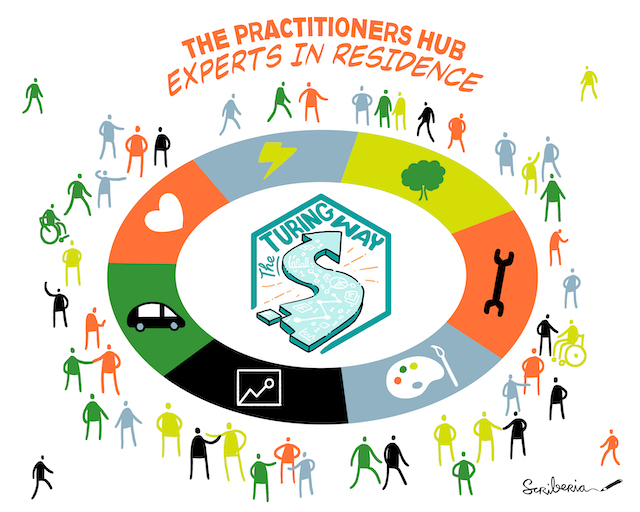
Figure 1:An overview of the diverse industries and people comprising the cohort of The Turing Way Practitioners Hub Experts in Residence. The Turing Way project illustration by Scriberia. Used under a CC-BY 4.0 licence. DOI: The Turing Way Community & Scriberia (2024).
Introduction to The Turing Way Practitioner’s Hub¶
The Turing Way Practitioners Hub is an extension of The Turing Way project that engages and involves industry experts, called Experts in Residence (EiRs), from partnering organisations. This initiative aims to advance their efforts in promoting best practices in data science and AI. The Practitioners Hub serves as a platform for cross-sector collaboration, knowledge exchange, and strategic partnerships, spanning various sectors and data science initiatives, including but not limited to the small and medium-sized (SME) enterprises in the BridgeAI network. It is an evolving example of academia-industry collaboration which could be recreated in other contexts.
By leveraging a cohort-based approach, the programme builds a shared understanding of open source principles, open data practices, cross-sector collaboration, research reproducibility, and ethical considerations in the context of data science and AI. EiRs are supported to develop case studies with stakeholders in their networks, sharing insights into the successes and challenges associated with the adoption of AI within their respective sectors. This is combined with customised training, expert consultation and collaborative opportunities, contributing to the improvement and adoption of data science practices that enhance the quality, viability, and real-world impact of data science and AI technologies in their sectors. Regular events were held on Zoom/Teams, on a weekly/bi-weekly basis combining short-format training and day-long workshops. The Turing Way Collaboration Cafe events were leveraged as opportunities to meet and discuss specific topics between the workshops.
This work was supported by Innovate UK BridgeAI. The Practitioners Hub has also received funding and support from the Ecosystem Leadership Award under the EPSRC Grant EP/X03870X/1 and The Alan Turing Institute.
Case-studies¶
In 2023, The Turing Way team partnered with five organisations as part of the inaugural cohort of this programme, running over 6 months. The organisations involved were:
- British Antarctic Survey
- Genomics England
- Office of National Statistics
- Energy Systems Catapult
- DigiHaul
During the first cohort of the programme in 2023, the Turing Way team co-created impact-based case studies about best practice open source science and AI adoption with each of the EiRs, with the help of scientific writer Stuart Gillespie. A meta-case study was also produced to bring together learnings about the organisational adoption of open and responsible AI from each participating organisation.
Explore all case studies and other materials from the first cohort on Zenodo: zenodo
What went well¶
- The programme of activities was diverse, stimulating collaboration in different ways. It included but was not limited to training around open-source concepts and frameworks, co-hosting a fireside chat, and building impact-based case studies.
- Different organisations had different levels of familiarity with open-source and best practices going into the programme. A kick-off workshop helped to ‘level the playing field’. This was attended not only by the EiRs but other stakeholders and members of the BridgeAI network. During the workshop, there were breakout discussions, talks from speakers and a panel discussion.
Challenges and lessons learned¶
- ‘Downtime’ such as through open-agenda meetings or social events is useful. Some of the most productive conversations amongst the EiRs happened in the spaces between structured activities. As the programme went on, the curriculum incorporated allocated sessions for unstructured discussion.
- A challenge during the programme was for EiRs and trainers to be mindful of different levels of resource availability within the different organisations.
For more information about the Practitioners Hub including the case studies and more information about the cohort-based curriculum and activities, please visit the programme website.
- The Turing Way Community, & Scriberia. (2024). Illustrations from The Turing Way: Shared under CC-BY 4.0 for reuse. Zenodo. 10.5281/ZENODO.3332807
- Sharan, M., & Gillespie, S. (2024). Organisational Adoption of Open and Responsible AI: Meta Case Study from The Turing Way Practitioners Hub Cohort 1. Zenodo. 10.5281/ZENODO.10777730